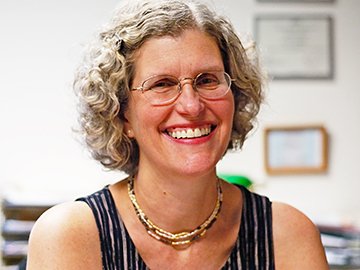
|
|
Vol. LXIII, No. 30
|
|
Wednesday, July 29, 2009
|
 (Photo by Craig Harris)
CONNECTING, CONNECTING, CONNECTING: Princeton Senior Resource Center Executive Director Susan Hoskins thrives on making connections with seniors, their caregivers, representatives of other local agencies, Township and Borough administrators, and just about anyone who happens to come by the Center’s facility at the Suzanne Patterson building, just behind Borough Hall.
|
Born and raised a Quaker, Susan Hoskins’s outlook on life is informed by the “SPICES”: simplicity, peace, integrity, community, equality, and stewardship. Certified in gerontology, she’s a natural as the leader of the Princeton Senior Resource Center, a private, non-profit 501C-3 organization, and one of two such centers in New Jersey. Besides “connecting,” another of Ms. Hoskins’s favorite words is “empower,” as in empowering people to make their own decisions. Not being a municipal department is a plus, she says, because it enables the Center to serve a wider community. Along with a phone call from Parsippany, recent calls from London and Madrid testify to the strength of the Center’s website (www.princetonol.com/groups/senior), and the facility’s reputation for best practices.
We really respond to the needs of the community, whether people are from Princeton or not. Whoever walks through the door gets attention, and unless I’m deeply in the middle of something I drop whatever I’m doing. Our mission is all about supporting seniors, their families, and their caregivers. I believe in independence, dignity, and self-determination, and empowering people to make their own decisions.
We serve people ages 55 to 105. We help families to identify levels of care for a senior family member, and help them to figure out the next stop. What are the risk factors? Are they still able to drive? Are they depressed? We try to reduce the risk factors so people can age in place. We can’t force anybody to do anything. We can offer them choices. There is no fee.
The biggest challenge right now is writing grant proposals. To write an effective grant proposal you have to be passionate about the organization and whatever the grant is going to be for — how the program is going change lives. We receive only 25 percent of our funding from the Township and the Borough. Individual donors, foundations and corporations, and program fees account for some additional income.
I’ve been here for almost eight years. There are only two full-timer employees: myself and Program Director Mauri Tyler. There are lots of part-time people and volunteers; we counted 330 volunteers at the end of last year. We have two offices, with two programs: classes and programs are held at the Suzanne Patterson Center, and our social service staff is at the Spruce Circle office off Harrison Street. About 625 people come to the Center each week for classes, and there are usually between 75 to 100 social service contacts at Spruce Circle every week.
Once a month we offer two caregivers’ support groups: “Children of Aging Parents,” and another for caregivers facing ethical dilemmas. So much of caregiving has to do with taking on more and more responsibility — including financial decisions — while a person is still with us. We each have our own tolerances of what we can do and what we’re willing to give. Sometimes there just aren’t any easy answers.
Another part of my role as director is facilitating communication between different parts of the organization while keeping an eye on the overall picture — how do all of these pieces fit together? We collaborate with other local institutions like the Recreation Department, the Princeton Public Library, Elm Court, and Community Without Walls; overall, we have about 25 collaborative partners. As a result of working with the Rec Department, an aerobic class meets here three times a week using Rec Department equipment. We also schedule two trips a year with them.
Although the library offers home delivery of books, there is a piece missing from this program: a home friend with whom to talk about books. Human contact is such an important piece. The biggest problem with people as they age is isolation and loneliness. If people enrolled in a particular program don’t show up for two weeks in a row, we call them to say “where are you?”
Evergreen Forum, our program that offers lifelong learning for senior adults, is an improvement on auditing University classes since the Everygreen Forum classes are small and discussion-based. Teachers love them because there are no papers to grade, and they love to talk to people who have more life experience. Upcoming classes include “Exploring French Opera,” “Iris Murdoch and Twentieth Century Social Comedy,” “Jefferson: The Kentucky Resolutions of 1798 and State Sovereignty,” and “The Geology Behind the Scenery.” I want to take all of them!
We have a bereavement support group, a widow’s support group, and “let’s talk” groups that meet at both Redding and Spruce Circles. High school students can perform community service through our Link Program. They visit senior adults, play Scrabble and talk. Seniors sometimes teach them; we had a French teacher who tutored and only spoke French with her young visitors, and something similar with Chinese residents at Elm Court. Students often stay in touch with their senior connections even after the program is over.
Part of the population we see is people who’ve moved to this community because their children live here. But how do you make friends? That’s what the Senior Resource Center is about.